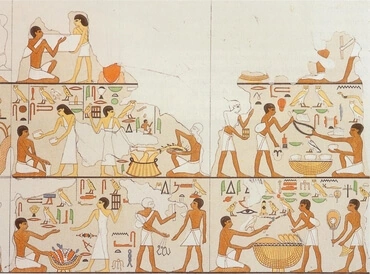Egitto

Nella Bibbia, Egitto significa conoscenza e amore della conoscenza. In senso buono questo significa conoscenza della verità dal Signore attraverso la Bibbia, ma in senso naturale significa semplicemente conoscenza terrena da immagazzinare e possedere. E anche la conoscenza dalla Bibbia non è sempre buona: se le impariamo con lo scopo di renderle utili, allora sono piene di idee angeliche. Ma lo sono quando vengono apprese solo per il gusto di sapere le cose o per la reputazione di essere dotti.
Quindi l'Egitto è un posto dove si va per imparare le cose, ma per diventare celesti bisogna sfuggire allo sterile "sapere" e viaggiare verso la terra di Canaan, dove la conoscenza è riempita dal desiderio interno di bene.
È interessante che quando l'Egitto era governato da Giuseppe, era un rifugio per suo padre e i suoi fratelli. Questo dimostra che quando la mente interna di una persona governa nella terra dell'apprendimento, può imparare molto di utile. Ma alla fine sorse un faraone che non conosceva Giuseppe, e i figli di Israele furono ridotti in schiavitù. Il faraone rappresenta la mente esterna; quando è al comando, l'eccitazione e l'autocompiacimento del sapere possono ridurre la mente interna ad un tipo di schiavitù. La mente - come i figli d'Israele - finisce per fare mattoni, o falsità create dall'uomo a partire dalle apparenze esterne.
(Odkazy: Apocalisse Rivelata 503 [1,3,5]; Arcana Coelestia 1461, 5580)
Arcana Coelestia # 5580
5580. 'Which they had brought from Egypt' means which had been obtained from factual knowledge. This is clear from the meaning of 'Egypt' as factual knowledge, dealt with in 1164, 1165, 1186, 1462, from this knowledge being meant by 'they had brought from there'. In the good sense 'Egypt' means the facts which the Church possesses, that is to say, which serve the Church in the outward form it takes, 4749, 4964, 4966. Facts of this kind, like the porch leading into a house, serve to introduce a person into the truths which the Church possesses.
[2] For the impression of those facts on a person's senses takes place first, and this opens the way into the more internal parts of the mind. Indeed it is well known that the area of external sensory perception is opened up first in a person, then that of the more internal sensory perceptions, and finally that where intellectual concepts reside; and that once the area where those concepts reside has been opened up, such concepts there are represented, to enable them to be understood, within those sensory impressions. The reason for this is that intellectual concepts spring up out of sensory impressions by a process of extraction from them; for intellectual concepts are deductions which, once they have been made, are separated from and rise far above sensory impressions. The presence of spiritual influences coming from the Lord by way of heaven is what accomplishes all this. From these things one may see what is implied by truths obtained from factual knowledge.






